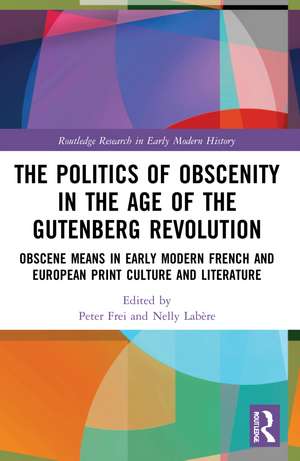The Politics of Obscenity in the Age of the Gutenberg Revolution: Obscene Means in Early Modern French and European Print Culture and Literature: Routledge Research in Early Modern History
Editat de Peter Frei, Nelly Labèreen Limba Engleză Paperback – 25 sep 2023
| Toate formatele și edițiile | Preț | Express |
|---|---|---|
| Paperback (1) | 392.60 lei 6-8 săpt. | |
| Taylor & Francis – 25 sep 2023 | 392.60 lei 6-8 săpt. | |
| Hardback (1) | 1008.48 lei 6-8 săpt. | |
| Taylor & Francis – 31 dec 2021 | 1008.48 lei 6-8 săpt. |
Din seria Routledge Research in Early Modern History
-
 Preț: 326.55 lei
Preț: 326.55 lei -
 Preț: 377.28 lei
Preț: 377.28 lei -
 Preț: 303.80 lei
Preț: 303.80 lei -
 Preț: 313.91 lei
Preț: 313.91 lei -
 Preț: 312.56 lei
Preț: 312.56 lei -
 Preț: 324.64 lei
Preț: 324.64 lei -
 Preț: 311.14 lei
Preț: 311.14 lei -
 Preț: 326.49 lei
Preț: 326.49 lei -
 Preț: 305.71 lei
Preț: 305.71 lei -
 Preț: 314.44 lei
Preț: 314.44 lei - 9%
 Preț: 1004.63 lei
Preț: 1004.63 lei -
 Preț: 325.72 lei
Preț: 325.72 lei -
 Preț: 311.43 lei
Preț: 311.43 lei -
 Preț: 310.22 lei
Preț: 310.22 lei -
 Preț: 309.60 lei
Preț: 309.60 lei -
 Preț: 310.56 lei
Preț: 310.56 lei -
 Preț: 326.49 lei
Preț: 326.49 lei - 18%
 Preț: 998.71 lei
Preț: 998.71 lei -
 Preț: 416.22 lei
Preț: 416.22 lei - 31%
 Preț: 765.84 lei
Preț: 765.84 lei - 31%
 Preț: 763.81 lei
Preț: 763.81 lei -
 Preț: 382.47 lei
Preț: 382.47 lei -
 Preț: 416.09 lei
Preț: 416.09 lei - 31%
 Preț: 764.62 lei
Preț: 764.62 lei - 18%
 Preț: 995.54 lei
Preț: 995.54 lei - 18%
 Preț: 1000.27 lei
Preț: 1000.27 lei -
 Preț: 392.67 lei
Preț: 392.67 lei - 31%
 Preț: 765.43 lei
Preț: 765.43 lei - 30%
 Preț: 769.11 lei
Preț: 769.11 lei - 18%
 Preț: 1057.13 lei
Preț: 1057.13 lei - 28%
 Preț: 655.70 lei
Preț: 655.70 lei - 18%
 Preț: 1000.27 lei
Preț: 1000.27 lei - 18%
 Preț: 1060.25 lei
Preț: 1060.25 lei - 31%
 Preț: 678.69 lei
Preț: 678.69 lei - 18%
 Preț: 1054.71 lei
Preț: 1054.71 lei - 18%
 Preț: 1001.07 lei
Preț: 1001.07 lei - 30%
 Preț: 819.32 lei
Preț: 819.32 lei - 31%
 Preț: 763.81 lei
Preț: 763.81 lei - 30%
 Preț: 847.31 lei
Preț: 847.31 lei -
 Preț: 382.36 lei
Preț: 382.36 lei - 31%
 Preț: 764.20 lei
Preț: 764.20 lei - 19%
 Preț: 279.31 lei
Preț: 279.31 lei
Preț: 392.60 lei
Nou
Puncte Express: 589
Preț estimativ în valută:
75.12€ • 81.86$ • 63.30£
75.12€ • 81.86$ • 63.30£
Carte tipărită la comandă
Livrare economică 23 aprilie-07 mai
Preluare comenzi: 021 569.72.76
Specificații
ISBN-13: 9780367537531
ISBN-10: 0367537532
Pagini: 390
Ilustrații: 3 Tables, black and white; 1 Line drawings, black and white; 6 Halftones, black and white; 7 Illustrations, black and white
Dimensiuni: 152 x 229 x 21 mm
Greutate: 0.52 kg
Ediția:1
Editura: Taylor & Francis
Colecția Routledge
Seria Routledge Research in Early Modern History
Locul publicării:Oxford, United Kingdom
ISBN-10: 0367537532
Pagini: 390
Ilustrații: 3 Tables, black and white; 1 Line drawings, black and white; 6 Halftones, black and white; 7 Illustrations, black and white
Dimensiuni: 152 x 229 x 21 mm
Greutate: 0.52 kg
Ediția:1
Editura: Taylor & Francis
Colecția Routledge
Seria Routledge Research in Early Modern History
Locul publicării:Oxford, United Kingdom
Cuprins
Introduction: The Obscenity of Books: The Politics of the Obscene in Early Modern Print Culture Part 1: Obscene Means: What It Means to Be Obscene Obscene Materials in Manuscript Culture and Early Prints 1. The Politics of Obscenity in Les Monstres des hommes, a Thirteenth-Century Manuscript 2. The "Hermaphrodite" of Modena: The Confusion That Made Her Disonesta (Twelfth to Sixteenth Centuries) 3. X-Rated Letters: When the ABC Turns You On 4. Courtly Obscenities Between the Middle Ages and the Renaissance: From the "Forest de Longue Attente" to the Rondeaux and Ballads of the "Gaudisseur Amant" in La Chasse et le Départ d’Amours (Paris, Vérard, 1509) 5. Even in Latin… Deterritorializations of the Obscene Shifting Obscenities, from Manuscript to Print 6. To Be or Not to Be Part of the Cent Nouvelles Nouvelles: Representing the Obscene in Manuscript and Print 7. Villon’s Imprint: Obscenity and Vulgarity in the Early Age of Print Part 2: Obscene Expositions: Obscenity and Renaissance Print Culture Impressions of the Body: The Genres of Renaissance Obscenity 8. From Panurge to Pan: Rabelais’s Fictions of Undiplomatic Diplomacy and the Ambassador’s Pleasure 9. Sentimental Obscenity 10. Les Blasons anatomiques du corps feminin and the Fabrication of Nudity. Appendix to Chapter 10: An Unpublished Counter-Blazon "by a Young Woman" The Religious Ob-Scene: Towards a Politics of Obscenity 11. Performing Protestant Identity Through Obscene Poetry: The Grenet Manuscript in the Age of the Printing Press 12. Pathways to the Obscene in Calvin and Calvinism 13. Obscenity on the Stage: A Double-Edged Sword Part 3: Impressions and Reimpressions of an Obscene Modernity The Language in Question or the Trouble with Words 14. "Libertinage de langue" and Gender Legislation: The Indecent Mobility of Signs 15. The Obscene, the Word, the Thing: Methodological Questions Afterlives: On the History of Obscene Books 16. Publishing Obscene Parodies. From Authorized Joyful Books to Forbidden Editions 17. Between the Early Modern and the Modern: The Resonance of Aretino. Epilogue: The Obscene Remains of the Past
Notă biografică
Peter Frei teaches French and Comparative Literature at the University of Fribourg (Switzerland).
Nelly Labère is Associate Professor (Maître de conférences HDR) at the University of Bordeaux Montaigne (France).
Nelly Labère is Associate Professor (Maître de conférences HDR) at the University of Bordeaux Montaigne (France).
Descriere
This volume offers scholars of early modern Europe a detailed understanding of the implications and the impact of obscene representations in their relationship to the Gutenberg Revolution which came to define Western modernity.
